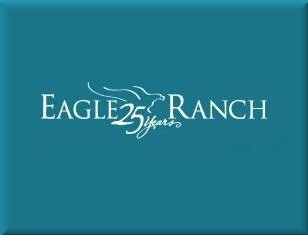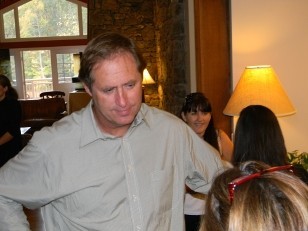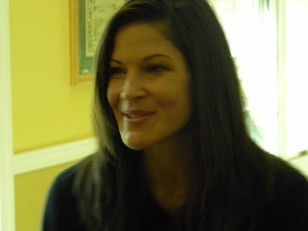"The essence of Eagle Ranch is to get things to a place where the child can return home," says Eddie Staub, Executive Director and Founder of Eagle Ranch on this bucolic Sunday afternoon as they celebrate their silver anniversary.
"Cross the stream and turn left at the horse pasture," are the instructions given to arriving guests at the front gate as they are welcomed by greeters, one of whom is Kay Ann Staub, Eddie's wife and ministry partner.
The tranquility one senses as they leave Kay Ann and travel the winding driveway through halcyon woods and approach the main lodge disguises the chaos that once was an ingredient in the lives of those who live here.
Almost without exception the 42 boys and 24 girls who currently call Eagle Ranch their home come from family situations that necessitate them living elsewhere until those family issues are resolved.
Most of these children have been referred to Eagle Ranch by schools, churches, community-based organizations, DFACS, or the juvenile court system.
Six boys' houses and four girls' houses, each with resident supervisor/counselors, along with an accredited on-campus school, athletic center, chapel, lodge, 10-acre lake, barns, and picnic pavilion provide a setting conducive to restoring balance and order in the lives of these at-risk teens.
But the legacy of success this Christ-centered ministry has experienced in a quarter-century of ministry cannot be denied, according to Stefanie Long, Director of Communication.
Long said, "The most encouraging thing that we have here today (for the celebration) is we have children that were here 20 or 25 years ago that are raising their own families today, and they say they are raising their own children in the way they learned when they were at the Ranch."
Long added, "That's so encouraging to know that we're not just impacting that child's life, but generations in the future."
Agreeing that "at-risk" children have existed since Cain and Abel, Founder Staub talked about the exponentially greater array of possible sources of trouble and temptation today's youth face on a daily basis.
"The internet, the cultural shift, drugs that are instantly addictive - those are things my generation never had to deal with," Staub said with a tone of sadness in his voice.
But, Staub explained, the front-page problems teens deal with today have made the general public much more cognizant of the challenges teenagers face. A quarter of a century ago those problems were much more insidious, as most teens had to deal with them alone.
Staub was a pioneer in 1985 with this sort of ministry, but today his vision is finding much broader acceptance.
Communications Director Long said that Eagle Ranch's program was being widened. "We're expanding the age range of the children we're taking. We're actually taking younger girls, age eight and up; we're also taking older girls in the latter teen age years."
Daniel Boddie is from Dallas, Georgia. Currently he attends Flowery Branch High School and credits Eagle Ranch as, "changing my life. I didn't want to come here."
Boddie continued, "I'm embarrassed, ashamed of some of the things I used to do. But Eagle Ranch has made me into a far better person. Now, for the first time in my life, I feel like we're a real family."
In the words of one of the counselors leading a tour through the house, Boddie, like so many others, now looks at life, "through a big windshield that shows a great future ahead, instead of looking into the much smaller rear view mirror that displays a turbulent past."
More information about Eagle Ranch is available through the link below, or you may telephone them at (770) 967-8500.


Eddie Staub, Founder

Stefanie Long, Director of Communications

Daniel Boddie, resident
http://accesswdun.com/article/2010/10/233262
